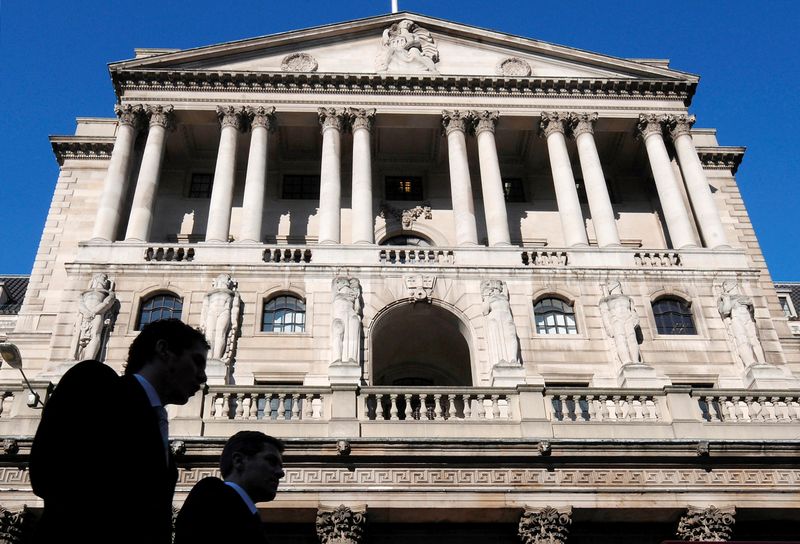By Andy Bruce and David Milliken
LONDON (Reuters) -The Bank of England raised interest rates again on Thursday in a bid to stop fast-rising inflation becoming entrenched, but it softened its language on the need for more increases as households face a huge hit from soaring energy bills.
Eight of the nine Monetary Policy Committee (MPC) members voted to raise Bank Rate to 0.75% from 0.5%, taking the benchmark for UK borrowing costs back to its pre-pandemic level.
BoE Deputy Governor Jon Cunliffe was the sole advocate of keeping rates on hold, warning of a big hit to demand from higher commodity prices.
On Wednesday the U.S. Federal Reserve also raised interest rates, the first time it had done so since the COVID-19 pandemic, and signalled an aggressive plan for more hikes to come, a contrast to the BoE's more cautious approach.
The British central bank has now raised rates at three consecutive meetings for the first time since 1997.
But investors were surprised no policymakers opted for a 50 basis point hike, after four did so last month. Most economists polled by Reuters had not expected any votes for rates to stay unchanged.
"The MPC struck an unambiguously dovish tone today, contrasting sharply with the predominant market narrative and the reasoning of both the European Central Bank and Federal Reserve," Citi economist Benjamin Nabarro said.
The BoE said inflation was set to reach around 8% in April -- almost a percentage point more than it forecast last month and four times its 2% target -- and warned it could peak even higher later in the year.
Soaring energy bills, driven up by the conflict in Ukraine, meant the pressure on British household budgets was likely to be much bigger than the record 30-year squeeze which the BoE predicted last month.
Reflecting these worries about the outlook for growth, policymakers on Thursday pushed back against investors' bets that Bank Rate will rise sharply to around 2% by the end of this year, toning down its language on the need for more hikes.
"The Committee judged that some further modest tightening might be appropriate in the coming months, but there were risks on both sides of that judgement depending on how medium-term prospects evolved," the BoE said.
Last month the MPC said further modest tightening "is likely to be appropriate".
STALLED CYCLE?
The pound slumped almost a cent against the dollar and British government bond prices jumped as investors trimmed their bets that the BoE would raise rates rapidly this year.
Samuel Tombs, an economist at Pantheon Macroeconomics, said an end to BoE rate hikes was in sight.
"Today's minutes leave us more confident in our view that the rate hiking cycle will stall after the Committee increases Bank Rate to 1.00%, most likely at the next meeting in May," he said.
Tombs pointed out that the drop in Bank Rate expectations in the futures market was the second-biggest since records stared in 2009, behind only November's rate decision, when the BoE surprised many investors by keeping rates on hold.
The BoE said inflation expectations remained well-anchored. But the majority of the MPC said they needed to raise rates now to reduce the risk that recent trends in pay growth and prices push up long-term inflation expectations.
Businesses surveyed by the BoE expect to raise pay by 4%-6% this year, compared with 2.5%-3.5% in 2021.
The BoE said Russia's invasion of Ukraine was likely to cause global inflation pressures to strengthen considerably in the coming months and add to supply chain disruptions.

Some analysts said the BoE had gone soft on inflation.
"What the MPC has done today, in concluding that the war in Ukraine generates two-sided risks to growth, is put itself even further behind the inflation curve," said Peter Chatwell, head of multi-asset strategy at Mizuho.